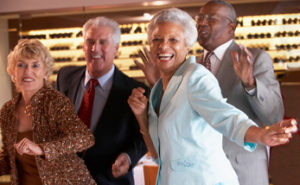 I’m not like most people. I realize that. When it comes to attitudes about aging, I really don’t fit in with the majority. While most people I know avoid the topic, I am obsessed with everything to do with aging. Even when I am with folks who either work in the field of aging or who are older themselves—most of the time, I’m the only one who wants to talk about aging. But there are others.
I’m not like most people. I realize that. When it comes to attitudes about aging, I really don’t fit in with the majority. While most people I know avoid the topic, I am obsessed with everything to do with aging. Even when I am with folks who either work in the field of aging or who are older themselves—most of the time, I’m the only one who wants to talk about aging. But there are others.
Lawrence R. Samuel, PhD. writes a blog for Psychology Today called Boomers 3.0 and is the author of many books, including Death, American Style and new this year, Aging in America.
While working on his latest book, Samuel asked people how they felt about their own aging experience. As he notes in a recent post, “many people said they just didn’t think much about it, as there was little point.” That’s been my experience, too. It’s as if they are either resigned to some kind of inevitable decline or are struggling to avoid focusing on anything but youth and vitality. The anti-aging industry’s enormous size is a testament to that.
Me, I see it coming and want to embrace it fully. That’s because it’s a mixed bag that has lots of benefits. Samuel gets that. He writes: “Learning that many folks don’t think much about aging was particularly surprising for me, because I view aging as a profound experience that shapes one’s whole outlook on life.” And that outlook can be really rich and meaningful.
Aging is a gift. It offers opportunities that deserve to be explored, not ignored. As Samuel points out, too often people focus on (or try to hide from) the negative aspects. Well, I’m here to tell you that—like the world shown through the evening news—what you think you know about aging is not at all as negative as it’s been portrayed.
Sure, there are some changes that you may not be thrilled about. But wasn’t that the case during puberty? Getting older is a part of life, and it’s gotten a bad rap long enough.
Here’s the scoop. It’s a myth that aging is all about loss. There are plenty of gains to be found, as well. Wisdom and contentment and freedom, to name a few. Studies have shown that the happiest decade for most people is not until they are in their 70s.
Samuel leaves us with this prescription: “The positive dimensions of aging, especially the wellbeing it often brings, need to be better documented and more compellingly expressed in order to counter the unhealthy attitudes Americans have toward getting older.” I couldn’t agree more.
You can read his blog post at https://www.psychologytoday.com/blog/boomers-30/201703/the-joy-aging.



